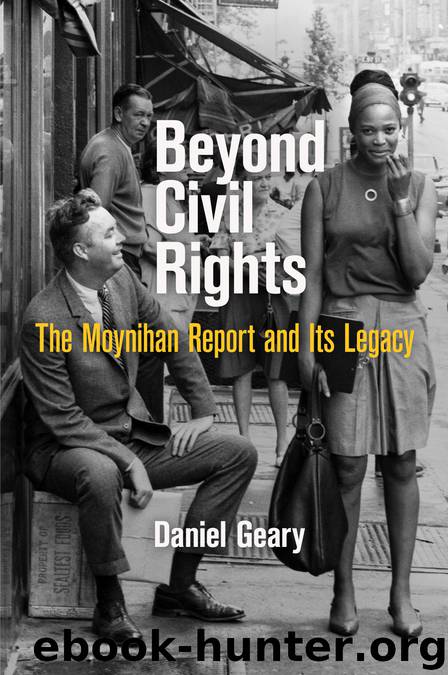Beyond Civil Rights by Geary Daniel;

Author:Geary, Daniel;
Language: eng
Format: epub
Publisher: University of Pennsylvania Press, Inc.
Published: 2015-12-29T05:00:00+00:00
CHAPTER 5
Feminism and the Nuclear Family Norm
In 1970, African American poet June Jordan wrote “Memo to Daniel Pretty Moynihan”:
You done what you done
I do what I can
Don’t you liberate me
From my female black pathology
I been working off my knees
I been drinking what I please
And when I vine
I know I’m fine
I mean
All right for each and every Friday night
But you been screwing me so long
I got a idea something’s wrong
with you
I got a simple proposition
You takeover my position
Clean your own house, babyface.1
A crucial figure in the Black Feminist movement, Jordan articulated what was by 1970 a common criticism of The Negro Family that emphasized its patriarchal ideals and its racial paternalism. Rejecting the report’s portrayal of “female black pathology,” Jordan celebrated African American women, averring that she was “All right for each and every Friday night.” Her poem made Moynihan an archetype of white male domination. “You been screwing me so long” evokes the history of white male sexual exploitation of African American women dating from slavery. Jordan’s closing injunction to the baby-faced Moynihan to “clean his own house” conveyed multiple meanings: white experts should stop making arrogant pronouncements about African American families; African American women working as domestic servants were fed up with their economic exploitation; and middle-class whites should address flaws in their own families.
The report was as much about normative family structure as about racial inequality. Moynihan consciously promoted “the values of a self-supporting, nuclear family, in which the male is normally the principal and, for some periods, the only wage earner.”2 While The Negro Family was immediately contentious, few early critics questioned its male-breadwinner model. Civil rights leader Bayard Rustin proclaimed that one of the report’s ideas “we can all accept” was “that the Negro family can be reconstructed only where the Negro male is permitted to be the economic and psychological head of the family.”3 An otherwise critical editorial in the liberal Protestant journal Christian Century agreed: “When Moynihan states that . . . an inordinate number of Negro families are matrifocal and that such a society humiliates and debases the Negro male he is saying nothing new, nothing prejudicial, and nothing debatable.”4 By 1968, however, Moynihan recognized that the nuclear-family norm he promoted had become controversial. He now complained about “social radicals” who failed to grasp that “the ‘middle class family’ . . . is as much a biological necessity as it is a cultural inheritance.”5
Feminists challenged the report as justifying gender inequality. Already in 1965 a few feminists questioned the report’s implication that policy-makers should target job opportunities for black men at the expense of black women. A few years later, radical feminists attacked the report as a brief for patriarchal domination. Black Feminists proved among the report’s most influential and comprehensive critics. To them, Moynihan propagated a pernicious myth of black “matriarchy” that combined racism with sexism. They noted that many African American male activists shared Moynihan’s idea that achieving racial equality required black men to be patriarchs. According to Michele Wallace, Moynihan
Download
This site does not store any files on its server. We only index and link to content provided by other sites. Please contact the content providers to delete copyright contents if any and email us, we'll remove relevant links or contents immediately.
| Anthropology | Archaeology |
| Philosophy | Politics & Government |
| Social Sciences | Sociology |
| Women's Studies |
The Secret History by Donna Tartt(19010)
The Social Justice Warrior Handbook by Lisa De Pasquale(12179)
Thirteen Reasons Why by Jay Asher(8878)
This Is How You Lose Her by Junot Diaz(6866)
Weapons of Math Destruction by Cathy O'Neil(6253)
Zero to One by Peter Thiel(5776)
Beartown by Fredrik Backman(5722)
The Myth of the Strong Leader by Archie Brown(5487)
The Fire Next Time by James Baldwin(5418)
How Democracies Die by Steven Levitsky & Daniel Ziblatt(5207)
Promise Me, Dad by Joe Biden(5135)
Stone's Rules by Roger Stone(5070)
A Higher Loyalty: Truth, Lies, and Leadership by James Comey(4942)
100 Deadly Skills by Clint Emerson(4906)
Rise and Kill First by Ronen Bergman(4766)
Secrecy World by Jake Bernstein(4733)
The David Icke Guide to the Global Conspiracy (and how to end it) by David Icke(4691)
The Farm by Tom Rob Smith(4494)
The Doomsday Machine by Daniel Ellsberg(4477)
